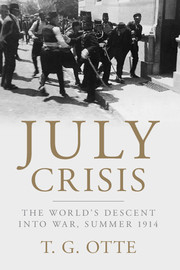Book contents
- Frontmatter
- Dedication
- Contents
- List of illustrations
- List of maps
- Preface and Acknowledgements
- List of abbreviations
- List of the principal dramatis personae
- Europe, 1914
- The Balkans, 1914
- Introduction
- 1 Prelude: the road to Sarajevo
- 2 Sarajevo and its echoes: 28 June to 5 July
- 3 The triumph of tactics over strategy: 6 to 21 July
- 4 Localizing the crisis: 19 to 23 July
- 5 The ultimatum: 23 to 26 July
- 6 Localizing the war: 26 to 28 July
- 7 Escalation: 29 July to 4 August
- Conclusion
- Index
- Plate section
- References
1 - Prelude: the road to Sarajevo
Published online by Cambridge University Press: 05 July 2014
- Frontmatter
- Dedication
- Contents
- List of illustrations
- List of maps
- Preface and Acknowledgements
- List of abbreviations
- List of the principal dramatis personae
- Europe, 1914
- The Balkans, 1914
- Introduction
- 1 Prelude: the road to Sarajevo
- 2 Sarajevo and its echoes: 28 June to 5 July
- 3 The triumph of tactics over strategy: 6 to 21 July
- 4 Localizing the crisis: 19 to 23 July
- 5 The ultimatum: 23 to 26 July
- 6 Localizing the war: 26 to 28 July
- 7 Escalation: 29 July to 4 August
- Conclusion
- Index
- Plate section
- References
Summary
The summer of 1914 did in fact begin well, better than so many earlier summers . . . After ten years or so of troubles and commotion, the people hoped at least for a lull and a good year which would recompense in every way for the harms and misfortunes of earlier years.
Ivo AndrićGreat historical events require a trigger moment. The occurrence that set in motion the chain of events which culminated in the First World War was the assassination of the Archduke Franz Ferdinand. The preparations for his visit to Bosnia-Herzegovina encapsulate the essential characteristics of that ancient empire whose throne he stood to inherit, the Habsburg Empire, just as the plot to kill him throws a revealing light on the currents and countercurrents of the Balkans, Europe’s most disturbed region in the years before 1914. But the chaos, confusion and coincidences at Sarajevo on 28 June 1914 also set the tone for the crisis that preceded the first general war since the defeat of Napoleon Bonaparte nearly a century earlier.
The Bosnian visit
The Archduke’s visit to the provincial capital of Bosnia-Herzegovina, administered by Austria-Hungary since 1878 and formally annexed in 1908, had long been planned. It originated with the Habsburg military commander and governor of the province, General Oskar Potiorek, who suggested in the late summer of 1913 that Franz Ferdinand might wish to attend the manoeuvres of the local XVth and XVIth Army Corps to be held in central Bosnia towards the end of June the following year.
- Type
- Chapter
- Information
- July CrisisThe World's Descent into War, Summer 1914, pp. 9 - 38Publisher: Cambridge University PressPrint publication year: 2014

